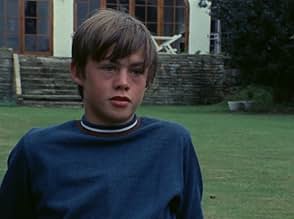7 Plus Seven
- TV Movie
- 1970
- 52m
IMDb RATING
7.9/10
3.4K
YOUR RATING
Director Michael Apted revisits the same group of British-born children after a seven-year wait. The subjects are interviewed as to the changes that have occurred in their lives during the l... Read allDirector Michael Apted revisits the same group of British-born children after a seven-year wait. The subjects are interviewed as to the changes that have occurred in their lives during the last seven years.Director Michael Apted revisits the same group of British-born children after a seven-year wait. The subjects are interviewed as to the changes that have occurred in their lives during the last seven years.
- Awards
- 1 nomination total
Bruce Balden
- Self
- (as Bruce)
Jacqueline Bassett
- Self
- (as Jackie)
Symon Basterfield
- Self
- (as Symon)
Andrew Brackfield
- Self
- (as Andrew)
John Brisby
- Self
- (as John)
Peter Davies
- Self
- (as Peter)
Suzanne Dewey
- Self
- (as Suzy)
Charles Furneaux
- Self
- (as Charles)
Nicholas Hitchon
- Self
- (as Nicholas)
Neil Hughes
- Self
- (as Neil)
Lynn Johnson
- Self
- (as Lindsay)
Paul Kligerman
- Self
- (as Paul)
Susan Sullivan
- Self
- (as Susan)
Tony Walker
- Self
- (as Tony)
Michael Apted
- Self - Narrator
- (uncredited)
Michelle Murphy
- Self (age 7, with Tony)
- (uncredited)
Featured reviews
Michael Apted must be congratulated for having (or perhaps stumbling upon) the vision for this study. Begin with 14 seven year olds in England, film them in a few interesting situations, and follow those same kids as they grow up. Every seven years. Because all of our lives transpire at roughly the same rates, we cannot actually observe children growing up. But this filmed approach is the next best thing.
This second film is a bit longer, and now has color in it, but still plays much like a home movie. Now we get to see, side by side, the same children at 7 and at 14. A very difficult age, 14 is. The shy ones are more shy, and the more assertive ones are starting to feel like they understand the world around them. We begin to see the very rough edges of children on the verge of young adulthood.
This and all the others through '42-UP' in 1998 are on the 5-disk DVD set just out. ("49 UP" has been made but is not yet available on DVD.) However, simply seeing the most recent film (42-UP or 49-UP) is pretty good, because each film contains snippets of each of the former ones, allowing us to see how each child developed in 7-year increments.
Just a marvelous study of growing up.
This second film is a bit longer, and now has color in it, but still plays much like a home movie. Now we get to see, side by side, the same children at 7 and at 14. A very difficult age, 14 is. The shy ones are more shy, and the more assertive ones are starting to feel like they understand the world around them. We begin to see the very rough edges of children on the verge of young adulthood.
This and all the others through '42-UP' in 1998 are on the 5-disk DVD set just out. ("49 UP" has been made but is not yet available on DVD.) However, simply seeing the most recent film (42-UP or 49-UP) is pretty good, because each film contains snippets of each of the former ones, allowing us to see how each child developed in 7-year increments.
Just a marvelous study of growing up.
It's funny to see other reviewers talking about the awkwardness of the subjects and the dullness of their lives. I suppose that might be true if you're watching this installment as a stand-alone film, but I just can't see many people doing that, knowing just how long the series actually took and how many other features are out there. This was where Apted took over the project and made it his own, and this is where we first get to see changes in kids. Suzy goes from being precocious to sullen and bratty, Paul evolves from a wise little buddha to a simply meek kind of fellow, and.we get the first glimpse of Neil's change from a sunny, laughing lad into the tortured soul he'll eventually become.
Preliminary confession-- i've only seen the first two installments, seven up and 7 plus seven. But I'm expecting the ensuing chapters to be far more interesting than 7 plus seven, which was plagued by the unavoidable fact that the subjects were all in the most wretched throes of self-conscious adolescence. made the film very difficult to watch. i might also blame the filmmaker-- perhaps he was so used to the open, honest confessions that he was able to pry from seven year olds that he just didn't do the necessary legwork in making sure that his 14 year old subjects were comfortable enough to interview. maybe he didn't anticipate the resentment the subjects felt towards HIM for making them sit there and interview. while 14 year olds CAN be self-conscious, they can also be motor mouths if they are put in the proper environment. i'm hoping to like the next installments much more.
Part two of the Up series, which loyally follows the formula established in 1964's Seven Up despite a change in the director's chair. By now the children of seven years prior have grown into adolescence, with all of their internal turmoil and social anxiety worn right out in the open; painfully obvious to the viewer if not the subject. The interviews feel less clinical this time around, as they generally take place in more comfortable, revealing personal settings (a living room or front lawn, in most cases) but the teens are far less cooperative and forthcoming. With just one or two exceptions, wringing a colorful response out of these kids is like pulling teeth, as they each struggle with quiet, navel-gazing uncertainty and a flood of wishy-washy almost-answers. That makes for some rather dry viewing (and several nearly-incomprehensible replies) but also serves as a very vivid, relatable throwback to the crippling difficulties common in this stage of the human metamorphosis. Nobody seems prepared to have reached the crossroads of life, except perhaps John (vocal and surprisingly adept at politics in his early teens) and Bruce (who bears an old soul). But maybe they just do a better job of hiding it than the others.
The second film in the "Up" series, "7 Plus Seven" catches those darling seven-year-olds at the awkward, self-conscious age of fourteen, which based on this film is evidently a universal. The film is cut between footage from "Seven Up" and footage from seven years later, which is at first jarring since cuteness quickly becomes smugness, and the like. Although, as predictable of the age, the Q & A approach chosen for the first film often feels like pulling teeth, certain key traits and moods of the children in this one will likely dictate far more about what's to come in future installments than could be conceived from volume one. This is a brilliant series of films that is just getting revved up with 1970's "7 Plus Seven'.
Did you know
- TriviaMichael Apted was an assistant director and researcher on Seven Up! (1964). Here, he steps in to the director's chair, vacated by Paul Almond. Apted would go on to direct all the rest of the films, and indeed would be the name associated with the series.
- Quotes
Himself - Narrator: Are you happier now than you were then?
- ConnectionsEdited into 42 Up (1998)
Details
Contribute to this page
Suggest an edit or add missing content




































